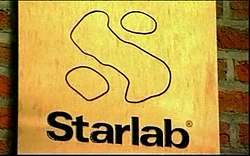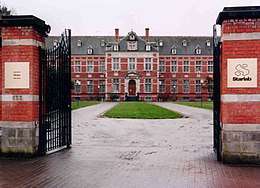Starlab
Starlab NV/SA was a multidisciplinary, blue sky research institute established to serve as an incubator for long-term and basic research in the spirit of Bell Labs, MIT Media Lab, Xerox PARC, and Interval Research. Its primary headquarters was based in Brussels, Belgium from 1996 to 2001. A second base of operations, Starlab Barcelona, was established in 2000 and remains in operation.[1]
 | |
 | |
| Formation | 1996 |
|---|---|
| Founder | Walter de Brouwer Nicholas Negroponte |
| Purpose | Fundamental research |
| Headquarters | Brussels, Belgium |
Region | International |
| Affiliations | MIT University of Oxford Ghent University |
Staff | 130 (2001) |
| Website | starlab.org |
Research
At its peak, Starlab employed over 130 scientists from thirty-six nationalities.[1] Starlab projects included intelligent clothing, stem cell research, emotics, transarchitecture, robotics, theoretical physics, e.g., the possibility of time travel, consciousness, quantum computation, quantum information, art, artificial intelligence, neuroscience, new media, biophysics, materials science, protein folding, nanoelectronics, and wearable computing. These research lines were grouped under the acronym “BANG,” or Bits, Atoms, Neurons, Genes, later adopted by MIT Media Lab in 2002.[2] The lab sponsored and collaborated with other labs and organized several international conferences and open research symposia.[1]
Members
Starlab's principal investors included venture capitalist Walter de Brouwer, founder and chief executive officer, MIT Media Lab founder Nicholas Negroponte, and Pythagorus investment fund manager Johan Konings. Walter Van de Velde served as chief scientific officer. Giulio Ruffini continues to serve as scientific officer for Starlab's Barcelona division. Academic and corporate partners received shared intellectual property rights to research and patents generated by the lab.
Closure
Starlab's business model depended largely upon third-party investment to sustain its operations. When the dot-com bubble burst, the loss of a critical group of investors forced the lab to close its doors in 2001. The lab's assets were liquidated, and the former embassy building inhabited by the lab was purchased by the Brussels regional government.
Starlab DF2 (Deep Future 2) Barcelona
The surviving research division in Barcelona, Starlab DF2, or "Deep Future 2," adopted a different business strategy, focusing on specialized, direct contracts with ESA under support of the Catalan and Spanish Governments. Founded by Manel Adell, Giulio Ruffini, and Ana Maiques, Starlab Barcelona maintains the interdisciplinary spirit of Starlab Brussels, but focuses on space and neuroscience technologies and applications. The lab has been awarded the Barcelona Innovation prize and other awards from ENDESA and BMW Innovation. It has produced spinoff Neuroelectrics.
Spinoffs
Some of the intellectual property generated by Starlab research projects was purchased by investors or continued at university and research centers worldwide. Philips purchased the intellectual property rights to intelligent clothing project i-wear, which won the Avantex 2000 Innovation Prize. Bioprocessors, a biotechnology spinoff, transitioned to Silicon Valley. Pajamanation, a global marketplace for outsourcing microjobs, launched in fifty countries in 2006.
Starlab Barcelona currently focuses on applied research initiatives in space and neuroscience.
Legacy
Starlab was featured in a Discovery Channel Special[3][1] and frequently cited by the international press.[4][5][6][7][8][9][10][11][12][13][14][15][16][17] The lab has since become subject of a theatre play by Jack Klaff at the Edinburgh Festival,[18] and a Gartner case study.[19]
See also
References
- Purcell, Chris (2001-09-05), Starlab: The Discovery Channel Special, Christopher Altman, Serguei Krasnikov, Jack Tuszynski, retrieved 2018-08-03
- Remembering Starlab
- Trailer - Starlab Discovery Channel Special, YouTube, 2006-11-30, retrieved 2018-08-03
- BBC News - SCI/TECH - Clothes that do the thinking
- Nature
- "CNN.com - Breaking News, U.S., World, Weather, Entertainment & Video News".
- TIME
- Fastcompany Archived 2007-09-30 at the Wayback Machine
- "Le Monde interactif : Starlab, la start-up belge qui se voulait plus grosse que le MIT".
- "Tech Culture". CNET. CBS Interactive.
- "EUROPEAN INNOVATION: Flying robots, time machines and 'intelligent' clothing are among the ideas that have emerged from Starlab, the Brussels-based 'blue sky' research centre". 2 April 2001. Archived from the original on 23 August 2001.
- Radio Netherlands
- "Archiv - morgenweb".
- "Next millennium's research and technologies showcased at Starlab's inaugural conference".
- Jean-Paul Baquiast et Christophe Jacquemin. "Robotique, vie artificielle, réalité virtuelle : La revue mensuelle n°12, par Jean-Paul Baquiast et Christophe Jacquemin -Visites virtuelles Starlab".
- New Scientist
- "nanotechweb.org".
- SPRL, wakatepe. "Jack Klaff's Homepage". www.jackklaff.com. Retrieved 2018-08-03.
- Nick, Casonato, Regina Jones. "Gartner Consulting Case Study of Innovation Risks". www.space-time.info. Retrieved 2018-08-03.